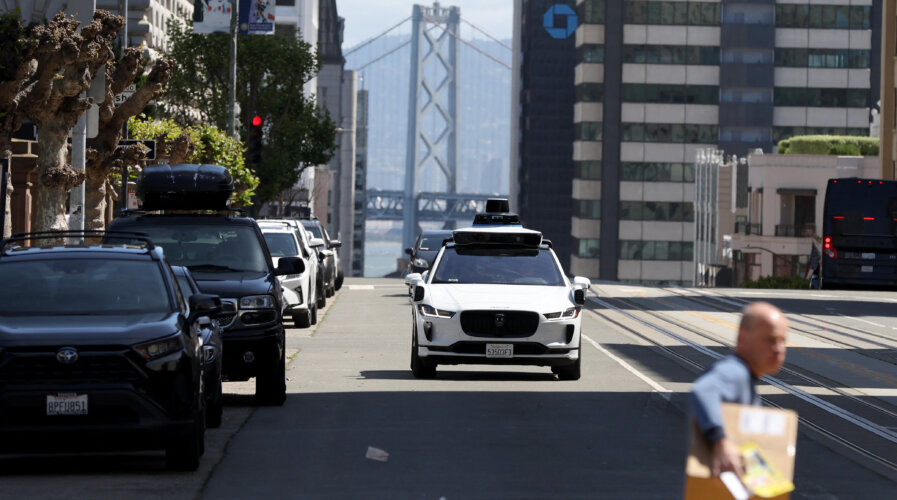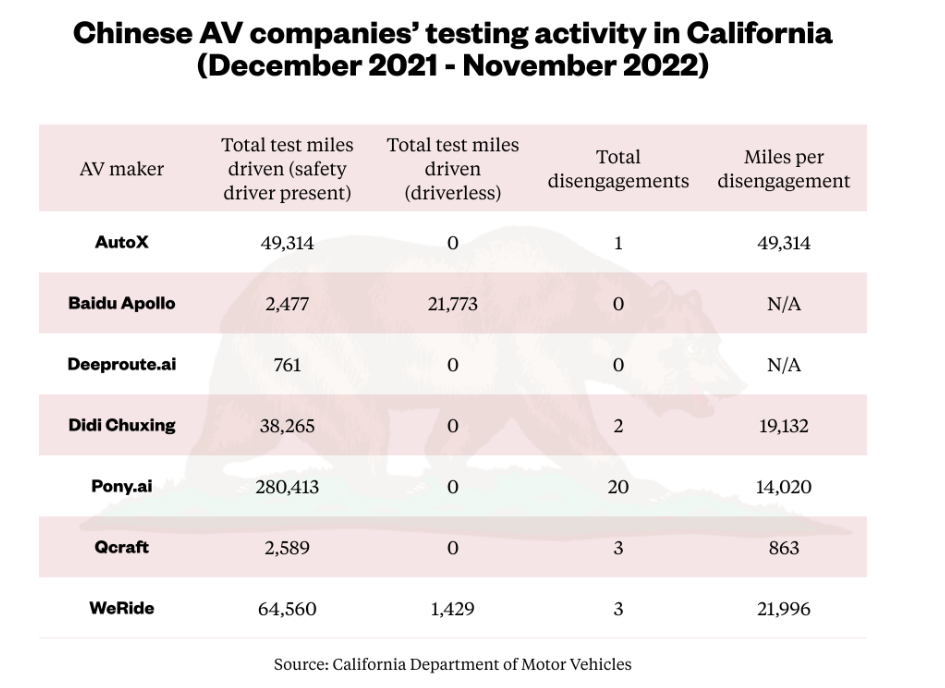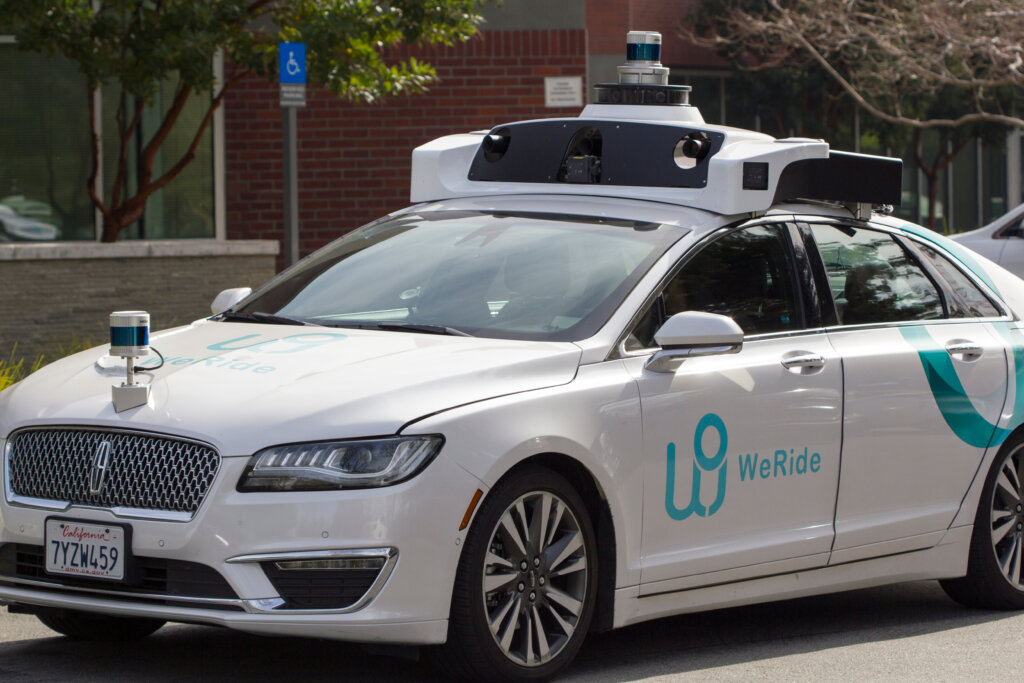
Some lawmakers in the US are calling for restrictions on the operations of Chinese autonomous vehicles in America.Photo: SAN FRANCISCO, CALIFORNIA – APRIL 11: A Waymo autonomous vehicle drives along California Street on April 11, 2022 in San Francisco, California. San Francisco is serving as testing grounds for autonomous vehicles with Waymo, a Google subsidiary and Cruise, a subsidiary of General Motors, logging millions of test miles throughout San Francisco in 2021. Justin Sullivan/Getty Images/AFP (Photo by JUSTIN SULLIVAN / GETTY IMAGES NORTH AMERICA / Getty Images via AFP)
Chinese autonomous vehicles in the US may soon be under scrutiny
|
Getting your Trinity Audio player ready... |
- Some lawmakers in the US are calling for restrictions on the operations of Chinese autonomous vehicles in America.
- US Transportation Secretary Pete Buttigieg admitted that there are concerns around transportation technologies.
When it comes to autonomous vehicles and the technology that goes behind them, China has been at the forefront in recent years. As US policymakers become more focused on espionage and surveillance, Chinese companies testing in California–the world’s largest autonomous vehicle test bed–may be on borrowed time.
The most recent indication is from US Transportation Secretary Pete Buttigieg, who told Reuters on July 20 that his agency has national security concerns about Chinese autonomous vehicle companies in the American market after some lawmakers called for restrictions on their operations.
First and foremost, the prominence of Chinese self-driving vehicles in the US can be based on the California Department of Motor Vehicles’ yearly report on autonomous vehicle testing in the state, released on February 17. Data showed that Chinese firms will continue to test their vehicles in the state throughout 2022, even as some policymakers voice concerns over national security risks.
Chinese firms, including Baidu’s Apollo, Pony.ai, AutoX, WeRide, Didi Chuxing, Qcraft, and Deeproute.ai, tested their autonomous vehicles in California last year, collectively racking up over 450,000 miles in test miles driven during the period covered by the report (December 2021 through November 2022). Pony.ai led the pack of Chinese firms, with its test vehicles going 280,413 miles.

Source: California Dept of Motor Vehicles
It is worth noting that Chinese AV makers didn’t quite match the level of testing they conducted in 2021 when they drove test vehicles over 510,000 miles around California. Although most AV makers decreased their testing in California from the previous year, WeRide and Apollo surpassed their testing numbers in 2021.

Chinese self-driving startup WeRide branded autonomous vehicles seen undergoing testing at the company’s San Jose corporate campus in the Silicon Valley, California.
Chinese autonomous vehicle companies like Inceptio, NIO, and XPeng have permits to test in the state, but the records show that they conducted no test drives last year.
What is the issue with Chinese autonomous vehicles in the States?
The fear of autonomous vehicles being turned into “weapons” goes back to 2017, when self-driving technology was seen advancing faster than regulators could keep up with. Since then, regional and national governments have been grappling with the issue of when to allow autonomous cars onto their roads and under what conditions.
By late last year, lawmakers were concerned about a flood of data-hungry cars from China taking over American streets. In a letter to the US National Highway Traffic Safety Administration dated November 18, 2022, Representative August Pfluger asked whether Washington is prepared for the security threat posed by the coming influx of Chinese-made intelligent and autonomous vehicles.
“I remain concerned that a lack of US oversight in AV technology has opened the door for a foreign nation to spy on American soil, as Chinese companies potentially transfer critical data to the People’s Republic of China,” Pfluger writes. He asked the regulator to explain how it has vetted the national security risk posed by these Chinese companies.
Fast forward to this year, in another July 17 letter to Buttigieg and Secretary of Commerce Gina Raimondo, a bipartisan group of four lawmakers asked for an investigation into the prevalence of Chinese AV technology in the US and how it can be restricted.
“Technology used by AVs, LiDAR, RADAR, cameras, AI, and other advanced sensors and semiconductors can all be used to collect data on the American people and infrastructure that could be shared back to China and ultimately to the Chinese Communist Party (CCP),” the lawmakers wrote. As with the November 2022 letter, the lawmakers in this July letter shared similar concerns on autonomous vehicles and equipment testing in the US.
“Whether we are talking about hardware or software, in the same way, there are concerns around telecom or TikTok, there are concerns around transportation technologies,” Buttigieg told Reuters in response to the letter he received.
What’s next for Chinese AV firms in the US?
Most US lawmakers argue that China could use autonomous and connected vehicles as a pathway to incorporate their systems and technology into America’s infrastructure. So far, the US and most of its allies have already banned Chinese corporate giant Huawei from building 5G infrastructure. So, the next frontier of the US-China war is most certainly the “next-generation” vehicles.
Frankly, the US is not alone in its fears. China themselves had that anxiety about American-made smart and electric vehicles. Earlier last year, for example, Beijing placed firm restrictions on where Teslas could drive, particularly around military installations, amid high-level Communist Party meetings.
Chinese companies with autonomous vehicles are still relatively unrestricted in California and are still taking full advantage of their testing permits. But, given the growing unease over Chinese espionage, the coming years could be difficult for China’s AV companies in the US.
READ MORE
- Safer Automation: How Sophic and Firmus Succeeded in Malaysia with MDEC’s Support
- Privilege granted, not gained: Intelligent authorization for enhanced infrastructure productivity
- Low-Code produces the Proof-of-Possibilities
- New Wearables Enable Staff to Work Faster and Safer
- Experts weigh in on Oracle’s departure from adland


